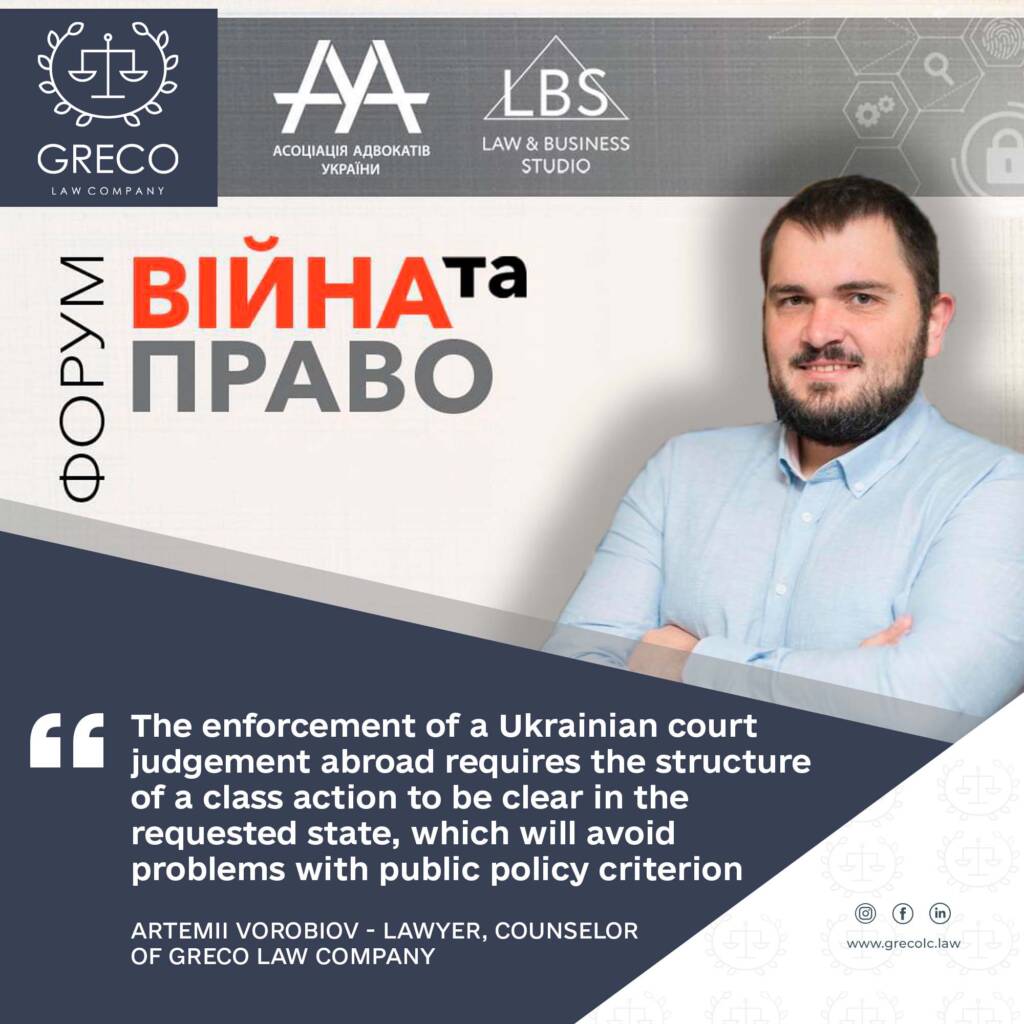
On February 28, the Association of Advocates of Ukraine conducted the forum “War and Law”, which was devoted to very important and painful issues for everyone regarding the damage caused, responsibility, compensation mechanisms, as well as the issue of legislative changes in Ukraine during martial law. Within the framework of this forum, a lawyer and an counselor of GRECO Law Company, Artemii Vorobiov, spoke about the institution of class (collective) actions as an effective mechanism of compensation for the harm caused as a result of military aggression.
In his report, Artemii Vorobiov emphasized that the practical implementation of class actions in Ukraine became possible thanks to litigations supported by GRECO Law Company, and this fact was also recently highlighted by the Judge of the Civil Court of Cassation within the Supreme Court of Ukraine, Vasyl Krat, in his presentation titled “Prospects for the introduction of class actions in Ukraine”. In Ukraine, the so-called “Dutch” model of class actions is in use, when non-governmental organizations (NGOs) are the initiators of class action lawsuits, acting in their own name, but in the interests of their members.
The lawyer paid special attention to the possibility of filing a class action to compensate for damages caused to citizens as a result of the russian invasion. After all, Ukrainians suffered not only pecuniary damage, but also harm to the health and environmental harm as a result of environmental pollution and violation of citizens’ rights to a healthy environment, as well as non-pecuniary damages caused as a result of infringement of various rights of citizens and their mental suffering. In Ukraine, there are no basic procedures and methods for calculating most types of these damages and harms, because the approved legal framework was primarily designed to assess the damage caused to the state, not to citizens. When delivering his report, Artemii Vorobiov emphasized that it was the class action that provided the possibility to protect people’s rights, as everyone must remember that a person, his/her life and health, honour and dignity, inviolability and security are recognized as the highest social value in Ukraine.
It is worth noting that the defendants in such a class action should not only be the russian federation as a sovereign and a person with the immunity under international law. This issue refers to russian oligarchs, state companies that promote aggression, are its beneficiaries and/or actively contribute to it. According to Art. 1190 of the Civil Code, they can be held jointly and severally liable.
“It is understood that it will be almost impossible to get compensation and enforce the court judgement within Ukraine alone, as the assets of the russian federation and a number of russian oligarchs have already been transferred or will be transferred to the state. That is why we are considering the issue of enforcing the Ukrainian court judgement on a class action in other jurisdictions.The enforcement of a Ukrainian court judgement abroad requires the structure of a class action to be clear in the requested state, which will avoid problems with public policy criterion. Thus, the Dutch model will be recognized in EU member states and England, as it does not violate public policy of these countries. That is why, by virtue of the institution of a class action, all victims can receive real compensation and fair satisfaction,” stressed Artemii Vorobiov.